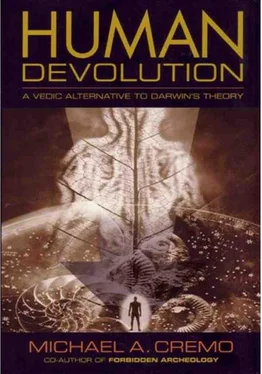Michael Cremo - Human Devolution - A Vedic Alternative To Darwin's Theory
Здесь есть возможность читать онлайн «Michael Cremo - Human Devolution - A Vedic Alternative To Darwin's Theory» весь текст электронной книги совершенно бесплатно (целиком полную версию без сокращений). В некоторых случаях можно слушать аудио, скачать через торрент в формате fb2 и присутствует краткое содержание. Год выпуска: 2003, ISBN: 2003, Издательство: Torchlight Publishing, Жанр: Старинная литература, на английском языке. Описание произведения, (предисловие) а так же отзывы посетителей доступны на портале библиотеки ЛибКат.
- Название:Human Devolution: A Vedic Alternative To Darwin's Theory
- Автор:
- Издательство:Torchlight Publishing
- Жанр:
- Год:2003
- ISBN:9780892133345
- Рейтинг книги:4 / 5. Голосов: 1
-
Избранное:Добавить в избранное
- Отзывы:
-
Ваша оценка:
- 80
- 1
- 2
- 3
- 4
- 5
Human Devolution: A Vedic Alternative To Darwin's Theory: краткое содержание, описание и аннотация
Предлагаем к чтению аннотацию, описание, краткое содержание или предисловие (зависит от того, что написал сам автор книги «Human Devolution: A Vedic Alternative To Darwin's Theory»). Если вы не нашли необходимую информацию о книге — напишите в комментариях, мы постараемся отыскать её.
Human Devolution: A Vedic Alternative To Darwin's Theory — читать онлайн бесплатно полную книгу (весь текст) целиком
Ниже представлен текст книги, разбитый по страницам. Система сохранения места последней прочитанной страницы, позволяет с удобством читать онлайн бесплатно книгу «Human Devolution: A Vedic Alternative To Darwin's Theory», без необходимости каждый раз заново искать на чём Вы остановились. Поставьте закладку, и сможете в любой момент перейти на страницу, на которой закончили чтение.
Интервал:
Закладка:
Richard Hodgson came to America in 1887 to run the American SPR. He was determined to expose Mrs. Piper. Hodgson was from Australia, and there was little chance that Mrs. Piper could know anything about his relatives. nevertheless, in trance she was able to give information about Hodgson’s family, including several deceased members. Hodgson arranged other sittings in 1888 and 1889. To guard against fraud, Hodgson hired detectives. They reported that neither Piper nor her friends or relatives were making suspicious inquiries. nor were they receiving reports from hired agents. for more experiments, Hodgson and James then sent Mrs. Piper to England. There the researchers chose sitters randomly and introduced them to Mrs. Piper anonymously at the last moment before a sitting. Under these conditions, Mrs. Piper was able to give unexpected information about the sitters and relatives. Back in Boston, she was studied for many more years by Hodgson, who remained convinced of her abilities (Gauld 1968, pp. 254–258). James said in a report: “I am persuaded of the medium’s honesty, and of the genuineness of her trance; and although at first disposed to think that the ‘hits’ she made were either lucky coincidences, or the result of knowledge on her part of who the sitter was and of his or her family affairs, I now believe her to be in possession of a power as yet unexplained” (James 1886–1889; in Murphy and Ballou 1960, p. 97).
But James could also be sympathetic to opposition. “I think,” he said (James 1897; in Murphy and Ballou 1960, pp. 39–40), “that the sort of loathing—no milder word will do—which the very words ‘psychical research’ and ‘psychical researcher’ awaken in so many honest scientific breasts is not only natural, but in a sense praiseworthy. A man who is unable himself to conceive of any orbit for these mental meteors can only suppose that Messrs. Gurney, Myers, & company’s mood in dealing with them must be that of silly marveling at so many detached prodigies. And such prodigies!” Here James emphasizes that scientists need to view psychical phenomena in the context of a theoretical background that can accommodate them. James noted that most critics rejected particular psychical events because they violated their presumption that events in nature always occurred in ways not allowed by the psychical events. But James felt that “the oftener one is forced to reject an alleged sort of fact by the use of this mere presumption, the weaker does the presumption itself get to be; and one might in the course of time use up one’s presumptive privileges in this way” (James 1897; in Murphy and Ballou 1960, p. 40). Specifically, James felt that the many telepathic reports from mediums like Piper “subtract presumptive force from the orthodox belief that there can be nothing in anyone’s intellect that has not come in through ordinary experiences of sense” (James 1897; in Murphy and Ballou 1960, pp. 40–41).
James believed the ultimate resolution to questions about the reality of psychical phenomena would best be accomplished by “a decisive thunderbolt of fact to clear the baffling darkness.” James declared, “for me the thunderbolt has fallen.” And this thunderbolt was the Piper mediumship. “In the trances of this medium,” said James, “I cannot resist the conviction that knowledge appears which she has never gained by the ordinary waking use of her eyes and ears and wits. . . . So when I turn to the rest of the evidence, ghosts and all, I cannot carry with me the irreversibly negative bias of the ‘rigorously scientific’ mind, with its presumption as to what the true order of nature ought to be” (James 1897; in Murphy and Ballou 1960, p. 41).
In addition to his absolute conviction in the reality of the mental phenomena of mediumship, James was open minded about the phenomena of physical mediumship, such as manifested by Home (i.e. floating accordions). for James, well documented poltergeist phenomena lent credibility to similar events experienced in the presence of mediums. In a presidential address to the Society for Psychical Research, James listed ten credible ghost and poltergeist cases, noting: “In all of these, if memory doesn’t deceive me, material objects are said to have been witnessed by many persons moving through the air in broad daylight. Often the objects were multitudinous. . . . I confess that until these records, or others like them, are positively explained away, I cannot feel . . . as if the case against physical mediumship . . . were definitely closed” (James 1896; in Murphy and Ballou 1960, pp. 62–63).
On the subject of occasional cheating by mediums in the production of physical phenomena, James pointed out that “Scientific men themselves will cheat—at public lectures—rather than let experiments obey their well-known tendency towards failure” (James 1911; in Murphy and Ballou 1960, p. 312). James gave several examples of physicists who rigged machines to give the desired results in public demonstrations. James himself confessed to this kind of cheating. Once Professor newell Martin was giving a demonstration on the physiology of a turtle’s heart. A shadow image of a real turtle heart was projected onto a screen for the audience. When the nerves of the heart were stimulated, the heart was supposed to move in certain ways. At a certain point in the demonstration, the heart stopped functioning. James, who was present as an assistant, recalled: “With my forefinger . . . I found myself impulsively and automatically imitating the rhythmical movements which my colleague had prophesied the heart would undergo. . . .To this day the memory of that critical emergency has made me feel charitable towards all mediums who make phenomena come in one way when they won’t come easily in another. On the principle of the S.P.R., my conduct on that one occasion ought to discredit everything I ever do, everything, for example, I may write in this article—a manifestly unjust conclusion” (James 1911; in Murphy and Ballou 1960, p. 313). Here James was objecting to the policy of the SPR of not reporting on mediums who were even once implicated in fraud.
James accepted the reality of a wide variety of facts differing from the set of facts considered by ordinary science. This is significant, because the kinds of facts accepted by science to a large extent determine its theories and laws, which establish relationships among these facts. Once science accepts certain categories of facts, and constructs theories and laws based on these facts, and further uses these theories and laws to explain and predict patterns among these facts, it becomes difficult to give serious consideration to facts that have no place in this system. James (1897, in Murphy and Ballou 1960 p. 26) said, “Phenomena unclassifiable within the system are therefore paradoxical absurdities, and must be held untrue.” He called the total collection of such absurd facts “the unclassified residuum.” James (1897, in Murphy and Ballou, pp. 25–27) observed: “no part of the unclassified residuum has usually been treated with a more contemptuous scientific disregard than the mass of phenomena generally called mystical . . . . All the while, however, the phenomena are there, lying broadcast over the surface of history. no matter where you open its pages, you find things recorded under the name of divinations, inspirations, demoniacal possessions, apparitions, trances, ecstasies, miraculous healings and productions of disease, and occult powers possessed by peculiar individuals over persons and things in their neighborhood.”
James hoped that future generations of psychologists and anthropologists would carefully study these phenomena “with patience and rigor” and integrate them into a proper theoretical framework, instead of receiving them with “credulity on the one hand and dogmatic denial . . . on the other.” He felt it was a “scientific scandal” that this had not yet happened (James 1897; in Murphy and Ballou 1960, p. 31). Indeed, he said, “The most urgent intellectual need which I feel at present is that science be built up again in a form in which such things may have a positive place” (James 1897; in Murphy and Ballou 1960, p. 42).
Читать дальшеИнтервал:
Закладка:
Похожие книги на «Human Devolution: A Vedic Alternative To Darwin's Theory»
Представляем Вашему вниманию похожие книги на «Human Devolution: A Vedic Alternative To Darwin's Theory» списком для выбора. Мы отобрали схожую по названию и смыслу литературу в надежде предоставить читателям больше вариантов отыскать новые, интересные, ещё непрочитанные произведения.
Обсуждение, отзывы о книге «Human Devolution: A Vedic Alternative To Darwin's Theory» и просто собственные мнения читателей. Оставьте ваши комментарии, напишите, что Вы думаете о произведении, его смысле или главных героях. Укажите что конкретно понравилось, а что нет, и почему Вы так считаете.












